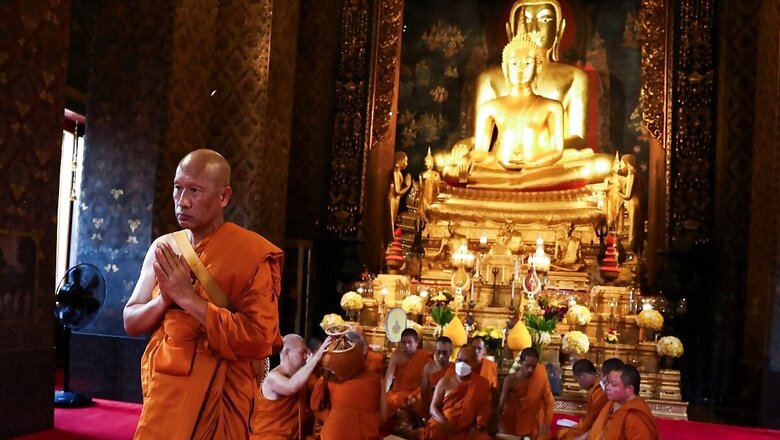
views
The Republic of Buryatia, tucked around 5,000 km away from the capital city of Moscow in Russia, is known globally for having the world’s largest freshwater reservoir, Lake Baikal. Spread over 23,000 sq. km, it holds 20 per cent of the world’s total freshwater reserves. Buryatia is also home to a large section of the Buddhist population in Russia.
After the collapse of the communist Soviet Union in 1999, Buddhism witnessed a major revival in Russia. With a population of around 1.5 million in Russia, Buddhists are largely spread over three major provinces of Russia-Buryatia, Kalmykia and Tuva. These three provinces are also home to some of the most ancient monasteries in Russia.
Understanding the significance of Buddhism, especially in the context of the global impact it could have as a soft power, Russia had recognised Buddhism as one of its official religions way back in 1741. From 1917 to 1999, there was no place for any religion in Russia as it was part of the Soviet Union governed by the Communist ideology. However, in the post-Soviet Union era, Russia has recognised four religions officially — Christianity, Buddhism, Islam and Judaism.
It is important to note that the United States and China both have been trying to use Buddhism as a part of their global geopolitical strategy. While the US has used the cause of Tibet to embarrass China when it suits the former, China has also started hosting the World Buddhist Conferences over the last few years.
Interestingly, India is home to one of the largest Buddhist populations. With around 8.5 million Buddhists in India, and the two top spiritual Gurus of Buddhists – the Dalai Lama and the Panchen Lama – being seated in India, it is clear that India is one of the most important players in the ‘Buddhist circuit’. However, unlike China or the US, it has neither tried to create a wedge amongst different sects in Buddhism nor it has tried to use it for geo-political purposes. India is the birthplace of Buddhism and that is recognised globally by Buddhists.
The Republic of Buryatia recently held an interesting and significant event in the form of a second international conference on Buddhism from August 12-14. A 13-member Indian delegation participated in this event and contributed significantly by presenting several papers. In fact, India is going to hold the World Buddhist Media Conclave in 2024. The International Buddhist Conference (IBC), one of the apex bodies working on promoting Buddhism in India and globally, is playing a pivotal role through its various outreach programmes in this regard.
It is important to note that the Russian Buddhist tradition is deeply rooted in the Pandito Khambo Lamas’ legacy for the last 260 years. Pandito Khambo Lamas are at the helm as spiritual gurus of Buddhists in Russia and they have time and again received the blessings of His Holiness Dalai Lama also. Incidentally the word ‘Pandito’ has come from the Indian vocabulary where the word ‘Pandit’ has been in use for the high priests for thousands of years.
In the second International Buddhist Forum (IBC) held at Ulan-Ude (August 12 to August 14, 2024), the capital of the Republic of Buryatia, a resolution was also passed by delegates from 13 countries having significant or majority Buddhist populations such as Bangladesh, Belarus, Brazil, Bhutan, Cambodia, China, India, Japan, Laos, Mongolia, Myanmar, Nepal, Russia, Sri Lanka, Thailand and Vietnam.
The resolution significantly mentions, “Buddhist communities engage in active collaboration with the state and other public institutions to educate individuals, bolster national customs, safeguard traditional values, and uphold religious liberties. We oppose any attempts to sow interreligious enmity, to turn Buddhism and other spiritual teachings into destructive cults and ideologies, to create conflicts between various Buddhist schools and streams, to use Buddhism to create sects that violate human interests and rights, to discredit other movements, to incite enmity, to promote extremism and separatism. Buddhism is an inclusive teaching that cannot be monopolized by any particular group.”
It also adds, “Admit the significant contribution of Pandito Khambo Lamas to the development of the Buddhist community, Buddhist philosophy, education and spiritual practice, the construction of harmonious state-confessional relations, the preservation of traditional spiritual and moral values, the development of humanitarian cooperation and international dialogue with the countries of the Buddhist world.”
The resolution emphasised that Buddhism is one of the greatest spiritual achievements of mankind, which has created a vast cultural tradition, and has promoted the establishment of ties between different regions and peoples of the world for thousands of years. All schools and movements within the Buddhist faith play an equal role in the broader Buddhist movement. In light of the challenges posed by modernity, the conference advocated for the preservation of traditional spiritual values, wisdom, compassion, and spiritual discipline. Additionally, the importance of fostering a sense of brotherhood among all individuals was also emphasised.
The writer is an author and columnist and has written several books. His X handle is @ArunAnandLive. Views expressed in the above piece are personal and solely those of the author. They do not necessarily reflect News18’s views.


















Comments
0 comment